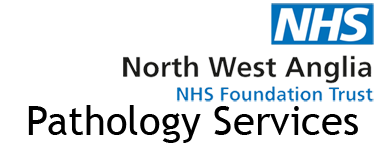Non - Cervical Cytology
Non - Cervical Cytology
Specimen requirements
The Cytology core hours are from 8:30 am to 5.00pm. There is no on-call service for Cytology. This should be taken into consideration for any samples taken outside of the core hours as any storage will potentially be detrimental to the sample quality and the cytological assessment of the sample.
Any samples taken out of the core hours should be refrigerated and then sent to the department as soon as possible within the core hours. For specimen collection, please see the department's specimen transportation page. For any concerns about spillages or disposal of clinical material, please view this link.
Specimens must be clearly identified with patient and specimen details, and accompanied by a fully completed Sunquest-ICE Cellular Pathology request form for hospital based requests and a Histology/Non-cervical Cytology request form for GP requests. All request forms should clearly state the patient details, site and type of specimen and all relevant clinical details.
The Cytology department must be notified of any urgent samples to ensure they are processed as soon as possible. Please ensure that you notify a member of the Cytology department of any urgent samples providing full details of the patient, sample and expected delivery time. If necessary the sample should be delivered directly to the Pathology reception. Contact numbers can be found on Key contacts.
For patient information sheets on Urine specimens for Cytology, please see the 'Information for Patients' page by clicking on this link.
Samples for transport to Peterborough City Hospital from Hinchingbrooke Hospital should be taken to the Pathology department at Hinchingbrooke Hospital within 2 hours of collection to ensure the sample is sent on the next transport run.
If any additional tests are required (for example, cell block creation), please be aware that specimen disposal occurs the following Monday after specimen authorisation. Therefore, if the test was authorised on the Thursday 2nd, the specimen would be disposed of on Monday 6th.
Urine
Special urine collection bottles containing preservative are available from the laboratory. A morning sample is preferable though not the first sample of the day.
Sputum
A morning specimen is preferable but not the first expectoration. The sample should be sent fresh and arrive at the laboratory within two hours of collection.
Sputum samples are not suitable for investigation of Pneumocystis carinii, bronchial washings should be taken.
Pleural fluids/pericardial fluid
At least 80 ml of fresh sample should be sent, if less than 80 ml send all the fluid and state in the clinical information that all the sample has been sent. The sample should arrive within two hours of the sample collection.
Ascitic fluids
Samples taken for therapeutic drainage need NOT be sent for analysis unless there is a specific clinical question to be addressed. Please ensure that samples for clinical assessment have relevant written information in the clinical details.
If there is clinical concern for spontaneous bacterial peritonitis (SBP) please DO NOT send the samples to Cytology. The sample should be sent in an EDTA tube or universal container to Haematology for body fluid analysis.
Joint fluids for investigation for crystals
Samples be sent fresh in a sterile universal container and should arrive within two hours of sample collection.
FNA samples
Direct slides should be labelled with patient’s full name and date of birth. Method of fixation should be stated, either air dried or alcohol fixed.
Needle washings should be collected in saline (injection type). The needle can be flushed through with the fluid.
Direct slides and needle washing samples should be sent together.
FNAs of cystic lesions where a quantity of fluid is aspirated should be sent in a universal container and be received in the laboratory within two hours of collection
Biliary samples
Bile, stent and biliary brushings can be sent in saline solution. The brush head can be cut off into the fluid and sent to the laboratory.
Bronchial samples
Direct preparations should be labelled with patient’s name and date of birth and the sample should be alcohol fixed. Brush samples can be sent in saline solution.
Bronchio-Alveolar-Lavage samples should be fresh and received within two hours of collection.
Cerebrospinal Fluid
Sample should be sent in universal sample pot and received within two hours of collection.



